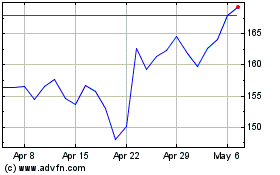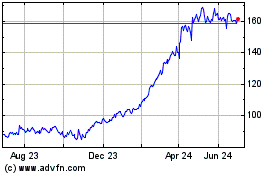Best Practices Get Big Backing -- WSJ
July 21 2016 - 3:03AM
Dow Jones News
By Joann S. Lublin
A powerful coalition of chief executives and big asset managers
endorsed a raft of corporate-governance practices such as avoiding
dual-class shares and replacing ineffective directors, seeking to
affect how U.S. public companies are run.
The governance principles, expected to be disclosed early
Thursday, were backed by the heads of Berkshire Hathaway Inc., J.P.
Morgan Chase & Co., General Electric Co., General Motors Co.
and Verizon Communications Inc. Asset managers including some of
the world's biggest -- BlackRock Inc., Vanguard Group Inc. and
State Street Global Advisors -- as well as one shareholder
activist, ValueAct Capital Management Ltd., were part of the
coalition.
"These principles are not intended to be for or against
activists, proxy advisors or special-interest groups," the group
said in a letter from the dozen participating firms. "Good
governance must be more than just a catch-phrase or fad."
The rise of activist shareholders in recent years has sparked
debate across markets and boardrooms about the role investors
should have in public companies and how boards should operate.
Activist investors have targeted some of the biggest U.S. companies
-- including some of the backers of the governance principles, such
as GE and GM.
One veteran activist shareholder who isn't part of the coalition
praised the latest governance push. "These principles are music to
our ears," said Nelson Peltz, a founding partner of Trian Fund
Management LP, whose investments include GE. "Sound corporate
governance can lead to better long-term growth and performance at
public companies."
The statement of principles emerged from a series of meetings
begun last summer by J.P. Morgan CEO James Dimon, with help from
Warren Buffett at Berkshire Hathaway. GE's Jeffrey Immelt, GM's
Mary Barra and Verizon's Lowell McAdam got involved later, a J.P.
Morgan spokesman said.
The goal "is to drive best governance practices through
companies of all sizes, not just the biggest -- where they are more
common today," said Glenn H. Booraem, fund treasurer at Vanguard,
who handles governance issues for U.S. equities. Gaining support
from leaders of large businesses "brings additional weight behind
these ideas," he said.
The coalition of companies and investors steered clear of
certain hot-button issues, such as splitting the roles of chairman
and CEO. (The principles suggested that independent directors
decide whether to combine those top two jobs.)
They also took no stance on director term limits, a rarity among
U.S. companies. But they took aim at some practices that might stir
controversy, such as dual-class voting.
Dual-class shares are more common in companies controlled by
founders, such as Mr. Buffett's Berkshire Hathaway. But investors
have long complained that dual-class shares -- which generally
grant one class super-voting power -- limit the ability of most
shareholders to enact change. Google Inc.'s 2004 initial public
offering sparked a trend of dual-class technology companies.
Mr. Buffett couldn't immediately be reached for comment. ( News
Corp, owner of The Wall Street Journal, and sister company 21st
Century Fox both have dual-class shares.)
The coalition's list of "Commonsense Principles of Corporate
Governance" also urged boards to "have the fortitude to replace
ineffective directors." There is infrequent turnover among
directors at S&P 500 corporations, where the median director
was 63 years old as of Oct. 31, according to a Wall Street Journal
analysis. The research found that at 24% of the companies, a
majority of the board had been in place for at least 10 years.
There should be a continuing board-refreshment process that
includes robust, regular evaluations of board members to ensure
their skill sets "remain sufficiently current and broad in dealing
with fast-changing business dynamics," the group said.
The group also recommended that boards consider periodic
rotation of committee chairmen and the lead independent director.
The notion of replacing committee leaders every few years "is an
emerging practice," Mr. Booraem said.
Broad support for such governance changes could have a ripple
effect, said Charles Elson, who heads the Center for Corporate
Governance at the University of Delaware's business school and
serves on the board of HealthSouth Corp. and Bob Evans Farms
Inc.
At smaller companies, Mr. Elson said, "it will be harder for
CEOs to oppose these principles when significant company CEOs and
investors like them."
Write to Joann S. Lublin at joann.lublin@wsj.com
(END) Dow Jones Newswires
July 21, 2016 02:48 ET (06:48 GMT)
Copyright (c) 2016 Dow Jones & Company, Inc.
GE Aerospace (NYSE:GE)
Historical Stock Chart
From Mar 2024 to Apr 2024

GE Aerospace (NYSE:GE)
Historical Stock Chart
From Apr 2023 to Apr 2024
